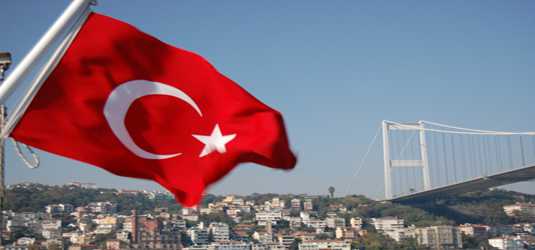Helle Dale
Wednesday, July 16, 2008
OP-ED:
Ask Turks whether they believe their country can be a model for a secular Muslim state and the answer is not quite as affirmative as one might have hoped. Today, the chasm between secular and religious Turks is growing ever-wider, and the strains within the Turkish state are seriously showing. The Turkish Constitutional Court is expected to rule in the next few weeks on whether the Turkish governing party, the Justice and Development Party (AKP), which is fundamentalist Muslim in nature, is subverting the country’s political system. The court has further been asked to decide whether the president, the prime minister and 71 of its other members should be banned from politics for five years – as requested by Turkey‘s chief prosecutor.
The equivalent would be a challenge from the U.S. Justice Department taken all the way to the Supreme Court over whether Democrats or Republicans (with Harry Reid, Nancy Pelosi and George Bush being the special targets) should be banned from political activity – a challenge that would shake the country and the American people’s faith in democracy to its core.
And so it is with Turkey, except that Constitutional challenges have been the order of the day for a while. The impact could nevertheless be devastating – not just for Turkey’s political situation at home, but also for its ever-dwindling chances to join the European Union, where Turkey’s political and human rights issues are being scrutinized closely.
What is critical as the case moves forward is that Turkey’s secular institutions remain protected from Islamist incursions, while at the same time, the democratic political system is sustained. This may, of course, be easier said than done as the tensions between the two grow more pronounced, as indeed they are in a number of European countries.
It all started in early February, when the AKP lifted a five-year ban on women’s headscarves in public universities in Turkey, a red flag for Turkish secularists. On March 14, Chief Prosecutor Abdurrahman Yalcinkaya took action accusing the AKP of overstepping its boundaries as a secular government and trying to install Sharia law in Turkey. This would be anathema in a country that, since its founding by Kemal Ataturk in 1923, has held to a strong secular tradition, making it a rare example of a secular, Muslim state. While the AKP submitted its defense in April, the court in June voted to uphold the ban on headscarves, a major defeat of the AKP.
It is far from the first time the Turkish courts and the military have stepped in to preserve this course. In 1960, a general-led coup ousted the president for misuse of public funds and for relaxing restrictions on Islam. In 1971, the military again stepped in and took action in 1980. Military intervention, however, was a trend that many in Europe, in particular, had hoped would be a thing of Turkey’s past, as clearly not the way to run a democracy. In August of 2007, however, the AKP majority party voted Abdullah Gul the first president of Turkey with an overtly Islamic leaning, a move that was fiercely opposed by the Turkish military, but reaffirmed in a popular vote. The stage was set for the confrontation between religious influence and political freedoms.
What makes the Turkish case so important and watched so closely abroad is that it is a crucible for the conflict taking place within Western civilization trying to accommodate growing Muslim populations. With the emergence of the Iranian theocracy in the late 1970s and the Taliban in Afghanistan in the 1990s, and with growing concern that other states of the Middle East might move in the direction of Muslim fundamentalist theocracy, this has been an issue of growing importance. Since Sept. 11 and the emergence of even more virulent strains of Islamist fundamentalism – whose remote but deeply held goal is the establishment of an Islamist Caliphate throughout the southern crest of Europe – these concerns have only deepened.
For many years, Turkey was often held up as the example of a Muslim country that had successfully managed to disentangle the thorny issues of religion and politics. Other countries, mainly in Asia, have also managed to pull it off – Indonesia for instance. Yet Turkey, with its critical location between East and West, has been a particularly appealing example for Westerners looking for a model.
As the United States has remained a steadfast ally of Turkey through all these years, the failure of the European Union to cement Turkey’s long-desired ties to Europe may well turn out to be a fatal mistake.
Helle Dale is director of the Douglas and Sarah Allison Center for Foreign Policy Studies at the Heritage Foundation.


Leave a Reply